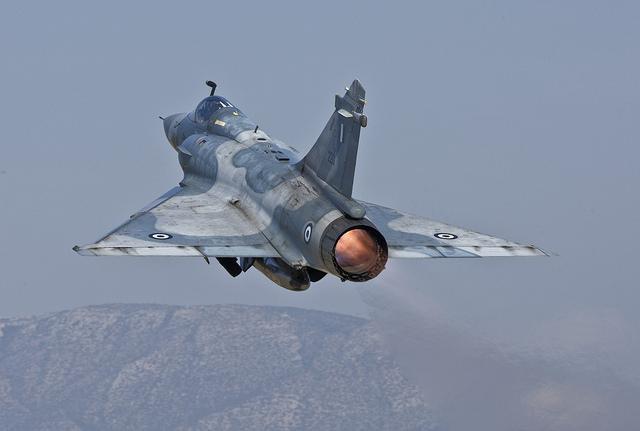Greek fighter jet comes down in deadly crash in Aegean
ATHENS

A Greek fighter jet came down in the Aegean Sea on April 12, with Greek officials confirming a pilot was killed after allegedly returning from a mission to intercept Turkish jets.
“A Greek pilot [has entered] the pantheon of heroes,” Defense Minister Panos Kammenos said in a tweet.
A Greek general staff source told Agence France-Presse that the Mirage 2000-5 plane was returning from a mission to intercept Turkish fighter jets.
“The mission was over and the plane was returning,” the source said, AFP reported.
Sources from the Turkish Air Force Command refuted claims there was a dogfight and said there were no Turkish jets there at the time of the crash.
State TV ERT said the warplane disappeared shortly before it was due to land on an airfield on Skyros island in the central Aegean.
The pilot was initially missing, however, was later reported to have died in the incident.
The accident comes at a period of heightened tension between regional rivals and NATO allies Greece and Turkey.
Verbal attacks have escalated recently between Turkish and Greek officials over Greece’s failure to extradite eight Turkish soldiers that Ankara said were part of an attempted 2016 coup.
A Greek appeals court on March 16 rejected a Turkish demand for the handover of eight Turkish soldiers accused of having a direct role in the failed coup and being members of the Fethullah Terrorist Organization (FETÖ).
The March 16 ruling marked the third extradition request that the Greek courts have refused, an issue that has strained relations between the two NATO allies.
The Turkish government accuses FETÖ of being behind a long-running campaign to overthrow the state through the infiltration of Turkish institutions including the military, the police and the judiciary.
In March, Turkey captured and is still holding two Greek soldiers who crossed the border into Turkey, allegedly whilst getting lost in the fog while on patrol.
Turkish courts have ordered their detention on suspicion of illegal entry and attempted military espionage. But Athens contends that the Turkish authorities have not given adequate details of the charges, or on what evidence they are based. Athens says the soldiers crossed into Turkey by mistake while following the trail of suspected undocumented migrants.
In another strain, a Greek court on April 3 rejected Turkey’s extradition request for a member of the outlawed far-leftist Revolutionary People’s Liberation Army-Front (DHKP-C). The Greek Appeals Courts also previously denied extradition requests for four other DHKP-C members: Hasan Biber, Hazal Seçer, Mehmet Doğan, and Şadi Naci Özpolat.
Ties between Ankara and Athens strained even more when Kammenos on April 4 said he had ordered the deployment of 3,500 additional military personnel in the Aegean and another 3,500 across Turkey’s border in Thrace to challenge the “enemy Turkey.”
















